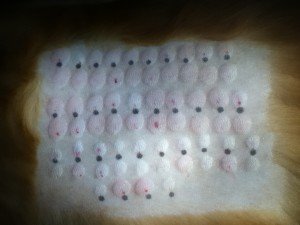Does your pet look like this?
Paw licking is a frequent symptom of allergies in both dogs and cats!
What could it mean if my pet licks their paws?
Paw licking can be a symptom of many things including:
- Airborne allergies
- Food allergies
- Bacterial infection
- Yeast infection
- Autoimmune disease, mites, nailbed problems, etc
What can I use at home to treat paw licking?
- It may be helpful to wipe your pet’s paws once to twice daily with baby wipes or an over the counter chlorhexidine product.
- For a bacterial infection, you may try applying over the counter Neosporin* to the paws twice daily.
- For a yeast infection, you may try applying over the counter miconasole cream* to the paws.
- These can be combined with an over the counter hydrocortisone cream once daily for 7 days. *For all topicals it is important to stop if the skin worsens and contact your veterinarian. With all topicals there is a chance of a drug eruption. It is important that you do not let your pet ingest the topicals.
What happens if these treatments do not work?
If these treatments do not work, it may be that your pet is suffering from allergies or has a more severe infection. In either of these cases, a trip to the dermatologist may be in order to diagnose and treat the problem.
How would a veterinary dermatologist treat allergies in my pet?
First, we would need to test your pet in order to identify which allergens he or she is reacting to. There are two different tests that are commonly used to identify these allergens; intradermal skin testing and IgE blood testing. Intradermal skin testing is typically only offered by a veterinary dermatologist or allergist. It is a similar test to the skin test a human allergist performs. This will test the local allergic reaction in the skin to the pollen. (picture of skin test) A blood test measures the amount of antibody found in your pet’s circulating blood. However it does not test local organ levels and does not test that this antibody is causing the local physiologic reaction. This test can be helpful when there are respiratory signs of allergy and is recommended in addition to the intradermal skin test sometimes.
What happens after allergy testing?
Based on the results of the testing, a vaccine will be formulated that is specifically tailored to your pet! The goal of the vaccine is to gradually lessen their reactions to the allergens. This allows many pets to discontinue oral and topical medications that they have needed to control their allergies.
Intradermal skin testing


